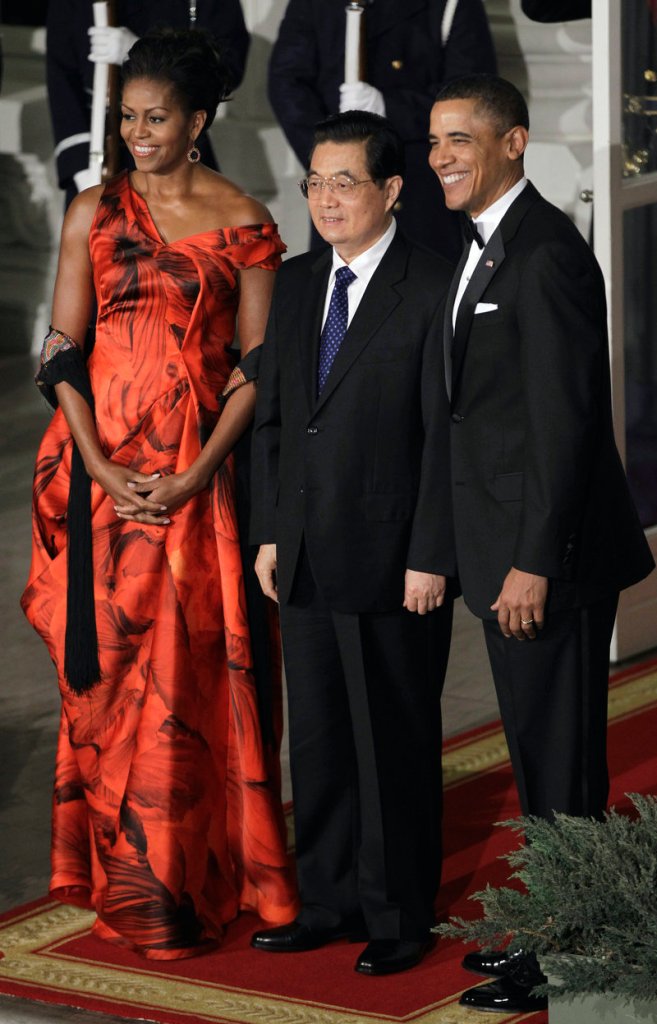WASHINGTON – The leaders of the world’s two most powerful economies unapologetically acknowledged their differences in a White House summit on Wednesday, but also stirred hopes for the U.S. and China to make progress on human rights and economic cooperation.
In a day of pomp and pageantry, Chinese President Hu Jintao signed on to a formal dialogue with the United States on human rights and said that his country needs to do more on the issue. He also agreed to ease Chinese regulations that limit foreign companies’ access to Chinese markets, a growing source of complaints for U.S. businesses.
The two leaders, in their eighth meeting, held their ground on other issues. Obama repeated his assertions that China’s currency is undervalued and that China needs to take steps to see that competition between the two superpowers is on a “level playing field.”
Yet it appeared the two leaders’ final summit would give Hu the respectful treatment he sought in the U.S. capital, and would satisfy Obama’s need to look firm on the economic, security and human rights issues that have divided them.
“It does look like both sides will come away happy,” said Drew Thompson, a China specialist at the Nixon Center in Washington.
The two leaders met in what is likely to be their final summit, as Hu is due to end his 10-year stewardship next year. After strife between the governments over economic and security issues and human rights, the summit was designed to stabilize the world’s most important economic relationship.
Both leaders emphasized repeatedly their intentions to deepen their cooperation, even as they continue to disagree on many aspects of their complex relationship. Obama emphasized that the United States does not intend to try to “contain” China, but hopes to benefit from its rapid and peaceful growth.
The White House, keen to show its concern about American jobs, announced $45 billion worth of U.S.-China business deals, which Obama said would produce 235,000 American jobs, many in manufacturing.
Many of the deals are only in a preliminary stage, Thompson said.
To help open markets to U.S. businesses, the Chinese government will modify regulations that give special benefits to “indigenous innovation,” U.S. officials said. Beijing also indicated it would ease regulations that have given an advantage to Chinese firms in government procurement.
On the human rights issue, Hu insisted that his country has made “enormous progress, recognized widely in the world.”
But he also said China is a developing country at a “crucial stage of reform,” adding that “a lot needs to be done in China” regarding human rights.
A senior Obama administration official said Hu’s admission was notable.
“It would be hard for me to recall a similar instance where a Chinese leader has made such an acknowledgement in a public setting like that,” said the official, who spoke on condition of anonymity because of the sensitive diplomatic situation.
Obama was firm on human rights. He said history shows that “societies are more harmonious, nations are more successful and the world is more just when the rights and responsibilities of all nations and all people are upheld, including the universal rights of every human being.”
Hu was eager to strengthen his legacy by showing Chinese audiences that he was accorded full honors. In 2006, Hu was embarrassed at a White House summit when he was denounced during a lawn ceremony by a protestor from Falun Gong, a banned Chinese sect.
He was received on Wednesday morning at the White House with a 21-gun salute — only given to heads of state — and by a color guard that included a fife and drum band in colonial American dress.
On Wednesday evening, he was feted with a state dinner.
Copy the Story Link
Send questions/comments to the editors.



Success. Please wait for the page to reload. If the page does not reload within 5 seconds, please refresh the page.
Enter your email and password to access comments.
Hi, to comment on stories you must . This profile is in addition to your subscription and website login.
Already have a commenting profile? .
Invalid username/password.
Please check your email to confirm and complete your registration.
Only subscribers are eligible to post comments. Please subscribe or login first for digital access. Here’s why.
Use the form below to reset your password. When you've submitted your account email, we will send an email with a reset code.